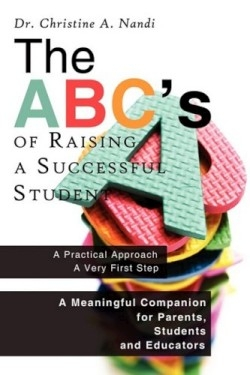The ABC's of Raising a Successful Student
The issue of raising student achievement is a concern across the country. Christine Nandi takes up the torch prescribing a set of “shoulds” and “musts” for students parents and teachers that she claims will “upsurge student achievement in all schools across America and possibly around the world.”
Nandi says most teachers believe literary success is “within the grasp of almost everyone” who makes the effort yet when achievement is low policy makers blame schools rather than students’ study habits. Therefore Nandi who calls herself “a zealous parent and a phenomenal teacher” puts the onus on parents to enforce student effort.
Many of Nandi’s rules are based in common sense; she stresses the importance of completing homework going to bed at a sensible time organizing the night before eating a good breakfast staying in contact with teachers. These rules ones she used to raise her daughter yielded what she calls “exquisite distinctive exemplary and outstanding results.”
Families looking for specific guidelines may find this comprehensive set a bit obsessive. Nandi advocates for example that parents request daily reports from teachers and that new checklists be devised after examining the child’s work each day. Nandi suggests typing these while students do homework.
Other rules: students should relax in a nightly bath to prepare the body for sleep and read for an hour before a bedtime set early enough to provide the prescribed nine to twelve hours of sleep. If parents work students must log a summary of what they read for parents to check. Students must start homework no later than fifteen minutes after they arrive home from school and the rest of the family must remain quiet. Parents must keep a supply of materials handy. Families should buy a fax machine so homework can be received from a friend if the student forgets to bring it home.
Families of less than successful students could well be overwhelmed by the unequivocal rules that seem to fill more hours than available in a day; little to nothing is mentioned about students who work or take part in extracurricular activities although the rules are meant for high school students as well as younger ones.
If there is a certain naiveté in what Nandi says it’s in the assumption that all parents have strict control of their children at all times and that explaining the rules to them will be enough to garner compliance. Her own involvement in her daughter’s projects appears excessive and suggests that Nandi advocates parents take on responsibility for things that many think should fall to the child. However her enthusiastic desire to help students find greater success is unquestionably heartfelt.
Following all of the advice will not be possible or necessary for most families and each family will need to choose for itself what will be worth implementing but following even a few of the suggestions will be a step in the right direction toward a more successful school year.
Reviewed by
Ruth Douillette
Disclosure: This article is not an endorsement, but a review. The publisher of this book provided free copies of the book and paid a small fee to have their book reviewed by a professional reviewer. Foreword Reviews and Clarion Reviews make no guarantee that the publisher will receive a positive review. Foreword Magazine, Inc. is disclosing this in accordance with the Federal Trade Commission’s 16 CFR, Part 255.

